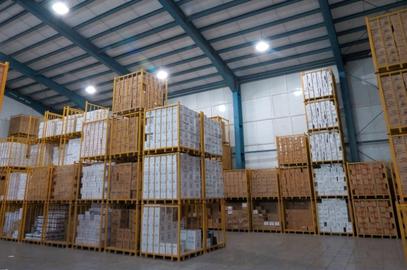The hike in the price of diapers has turned Masoumeh’s life into hell. At the moment, to take care of her twins, Masoumeh, a domestic worker in Robat Karim near Tehran who supplements her income with seasonal work picking peaches, cuts up old tablecloths and bedsheets and uses them instead of store-bought diapers. “The babies get rashes and the chances of urinary infection are high but what else can I do?” she says.
The crisis started in early June when the fear of imminent US sanctions prompted people to stockpile, spending their savings to buy rice, cooking oil, cereal, soap and other everyday necessities. “You wouldn’t believe it: people bought sacks and sacks of rice, filled up the trunks of their cars and drove away,” a butcher in Karaj whose shop overlooks a grocery store told IranWire. He says that two truckfuls of rice sold out in two hours — but “nobody thought to buy baby diapers,” he says.
Soheyla Haghshenas’s husband has a monthly income of 2.5 million tomans, or close to $600 at the official rate. They pay around $360 for rent, leaving enough for other necessary expenses. It did not occur to them to stash away rice, cooking oil and tomato paste.
Soheyla used to buy a pack of 38 size 5 My Baby brand diapers for her baby boy Mohammad from Kourosh Supermarket at a discount price of 21,000 tomans, or $5. But on August 8, just four days after the first set of US sanctions were reimposed, she ran out of diapers. “I had to buy the same brand from Kourosh Supermarket for 31,000 tomans [$7.39],” she says. “When I ran out of diapers again I searched all the shops [in my area] but there was no sign of baby diapers. I felt confident that Kourosh Supermarket would have them. So I went there but the only thing they had was a few packs of size 4, for 45,000 tomans [$10.72] per pack,” — more than twice the price prior to August.
So now Soheyla is calculating something she never thought she’d have to, trying to figure out whether their family of five can financially survive if she changes her son’s diaper half as much as the directions on the pack recommends.
Rags for Diapers
Kobra,19, who lives in a shantytown of 200 households in the Gamma district of the Persian Gulf port of Mahshahr, has been using rags instead of diapers for her nine-month-old twins. She says her hands are sore from washing the old cloths but the monthly income of her 23-year-old husband Rahim, who works at a nearby carwash, is no more than 900,000 tomans, or $215, and they have a multitude of more vital expenses than diapers.
Kobra could never afford to buy diapers, not when it was $3.50 per pack and not now that the same pack costs $12. “A couple of times,” she says “when a pack of 14 diapers cost 12,000 tomans [$2.86] — before this [Iranian] new year — and when my husband Rahim got paid and felt happy, he would buy a pack of diapers on his way home and tell me: ‘you don’t have to wash rags tomorrow.’ And couple of times a charitable lady whose house I worked in bought me a few packs of baby diapers as a gift. I kept them and used them only when we went out. Now I cannot buy my baby powdered milk — I have to feed him bread soaked in tea — let alone luxuries like diapers.”
Marzieh became a mother 28 days ago. Her son was born prematurely and, as a result, suffers from hypersensitive skin. She tried domestic brands but now the doctor has told her to use foreign brands to stop the rashes and the little boils that have come up on the baby’s genital area. She bought a pack of Pampers, which cost 85,000 tomans — more than $20 — but uses them only when the redness between her son’s legs begins to spread.
Since sanctions were reimposed, few drugstores have been able to stock the variety of brands and sizes of diapers they once did. Even domestic diapers are usually not available in all sizes and every day there are rumors that domestic producers are on the edge of closing shop because of the rise in the prices of materials, itself a result of the steep fall in the value of Iranian currency. Even at much higher prices, most stores have run out of even domestic diapers.
After 40 Years of “Self-Sufficiency”
Marzieh tells IranWire that in the past 28 days she has spent 350,000 tomans, or $84, to buy diapers for her premature baby, even though her husband receives the same salary as he did a year ago. “When a commonplace thing like diapers can wreak havoc with the life of Iranians, how can we hope to cope with the sanctions on bigger fronts?” she asks. “People are shocked that after 40 years of claims of self-sufficiency we are unable to provide products as basic as baby diapers.”
Domestic diaper producers and sellers say they are not to blame for the rising prices. “Every time that Molfix diapers [made by the Chinese multinational conglomerate Alibaba] enter the warehouse, the price has gone up by at least 3,000 tomans [70 US cents],” says Alireza Majdamzadeh, Molfix’s representative in Khuzestan. “Add to this the increased cost of transportation from Tehran to other cities and the profit added by representatives and the store owners and you end up with the disastrous prices that we now have.”
According to Majdamzadeh, the price of a size 4 Molfix diaper has reached 52,000 tomans, or almost $12.50, which, he says, "is a scandalous price for a product that must be thrown into the trash two hours after it is used.”
But it is not only ordinary people who are talking about diapers. If someone searches Google using the Persian word for "baby diaper," they come across a wide range of comments — from Iran's ministry of health claiming innocence to tweets on the subject by Ezzatolah Zarghami, a member of the High Council of Cultural Revolution.
A Way to Sabotage
But one of the most interesting comments came from the Supreme Leader Ayatollah Khamenei. He blames the scarcity and the high prices of diapers on sabotage by the “enemy” — meaning the United States, which he says is trying to spread mistrust among Iranians. “Suddenly there is a shortage of diapers in Tehran and big cities,” he said on August 29 in a meeting with President Rouhani and members of his cabinet [Persian link]. “This really has happened and it is not an assumption...The enemy wants to enrage people against the government and government agencies. This is one of [the enemy’s] ways to sabotage.”
But Abbas Fasih Khoshgard, head of the Iranian Association for Hygienic Cellulose Industry, told Tasnim News Agency that 80 percent of raw material for domestically produced diapers are imported [Persian link.] Since the manufacturers cannot buy hard currency at official prices they must import what they need at open market prices. And he did not mention anything about the enemy’s conspiracy to keep Iranian babies dirty.
More on the Iranian economy’s troubles after the US withdrawal from the nuclear deal:
Can Iran Survive the Inflation Hike?, August 29, 2018
Parliament Grills Rouhani in Public Session, August 28, 2018
, August 27, 2018
Rouhani's U-Turn to Save Economy, August 10, 2018
Iran Appoints New Bank Governor as Freefall Continues, August 6, 2018
The Fall and Fall of the Iranian Rial, July 31, 2018
Iranian Protesters: Death to High Prices!, July 31, 2018
The Case of the Lost Euros in Aladdin Bazaar, July 3, 2018
Iran’s Currency in Turmoil — Again, June 25, 2018
Iran and its Fleeting Dream of New Airplanes, June 13, 2018
When Will US Sanctions Hit Iranian Oil Sales?, May 18, 2018
The Future of Iran’s Economy as the US Bows Out of the Deal, May 10, 2018
visit the accountability section
In this section of Iran Wire, you can contact the officials and launch your campaign for various problems


























comments